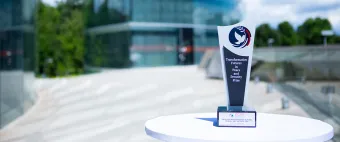GCSP Announces Prize Winners: Transformative Solutions for Peace and Security

GCSP Announces Prize Winners: Transformative Solutions for Peace and Security
The Geneva Centre for Security Policy (GCSP) revealed the winners of its 2024 GCSP Prize for Transformative Futures in Peace and Security on 22 May.
The award ceremony, held online as part of the GCSP Transformative Futures Day, celebrated groundbreaking ideas with the potential to address critical peace and security challenges.
This year's competition was highly competitive, attracting 166 submissions from 65 countries across five continents. After a rigorous evaluation, the jury scrutinized 15 shortlisted entries to identify the most groundbreaking contributions to the field. Three exceptional initiatives emerged victorious, propelling them towards wider recognition and potential global impact.
The 2024 winners of the GCSP Prize for Transformative Futures in Peace and Security are:
- First place: “Strategic Horizons: Exploring the Nexus of Space, Antarctica, and Global Security for Strategic Solutions in Challenging Times” submitted by Ms Victoria Valdivia from Chile. This submission wins a fully funded 2-month incubation programme within the GCSP’s Creative Spark.
- Second place: “PanScope - Global Information Hub” submitted by Ms Christina Kontomichalou of Panscope in the USA.
This project wins a Certificate of Recognition. - Third place: “Augmented Reality Futures Design: Democracy, Memory and Peace by Ukraine” submitted by Ms Yelyzaveta (Lisa) Glybchenko of Visual PeaceTech in Finland.
This project wins a Certificate of Recognition.
The winning project, “Strategic Horizons: Exploring the Nexus of Space, Antarctica, and Global Security for Strategic Solutions in Challenging Times”, tackles a critical issue: the gap between governance frameworks for Antarctica and outer space. This ambitious endeavour explores how the Outer Space Treaty and the Antarctic Treaty might clash, potentially undermining the legitimacy of Antarctic governance.
The project aims to equip policymakers with practical solutions. It proposes both binding and non-binding international guidelines, emphasizing the principles of peaceful use and the prevention of international conflict. By fostering collaboration between Antarctic and outer space experts, the project seeks to build networks and expertise to address these strategic challenges. Ultimately, it aspires to contribute to robust security and peace frameworks that can effectively navigate the complexities identified in this research.
Ms Victoria Valdivia declared:
"Winning this recognition is a great honour for me, not only because it is a recognition of the relevance of the merge in Antarctic and space activities for international security and peace, but also because it is the very first time that the prize is over Chile, opening new paths for the future of hundreds of talented colleagues contributing to the innovation on space and Antarctic activities on behalf a safety, secure and certain future for all humankind.
Chile has a natural Antarctic vocation, due to its high latitude and natural confection with the territory, but also because the Antarctic remains in Chilean identity since the beginning of its life as a country and nation. Studying the Antarctic but also outer space, will contribute to identifying a line of action to reduce emerging hazards and threats for international security but deeper, deeper for human security aspects.
In this endeavour there is something special being conducting this research from a southern perspective, and as General Ramón Cañas Montalva said in 1940: Chile has the key to the future of human and international security because the challenges - after the Atlantic era- will be set in the southern Pacific, connecting with this Terra Australis Incognita.
I want to express my deepest gratitude to GCSP for this prize and the trust in this research and its impact on the future of humankind."
The runner-up is “Panscope – Global Information Hub,” a project that adopts a unique approach to peacebuilding. This global initiative leverages a network of over 500 volunteers to democratize access to critical humanitarian information. Panscope’s innovative model combines three key elements:
- Youth-led digital monitoring: Young volunteers track developments and data online.
- Multilingual translation in over 100 languages: Complex information is translated into local languages, ensuring comprehension.
- Community-driven dissemination: Translated information is delivered directly to communities in 80+ countries, empowering individuals to make informed decisions and take action.
By integrating technologies like satellite data and user-friendly tools, PanScope enhances information delivery, promotes global transparency, and inspires individuals to contribute to a more peaceful and sustainable future. Their vision is further amplified by the Global Information Hub, a centralized platform ensuring critical information is readily accessible to anyone, anywhere.
Ms Christina Kontomichalou, who submitted the project, declared:
“Being recognized by the Geneva Centre for Security Policy is an incredible honour. This award not only empowers us as a youth-led organization but also reinforces our efforts to democratize access to critical information for communities worldwide. We aim to show that, regardless of age or background, we can all contribute to Transformative Futures.”
Taking third place, " Augmented Reality Futures Design: Democracy, Memory and Peace by Ukraine " uses augmented reality (AR) to equip Ukrainians with tools to design and iterate on digital demos of potential peace arrangements for their country. Through workshops and exhibitions, the project blends artistic design and AR technology. This fosters 'co-constitutive visual peacetech innovation' – a fancy way of saying participants collaboratively create and refine visual representations of peaceful solutions using AR. The core idea? Making peacebuilding less daunting. AR demos serve as tangible goals and allow for constant experimentation. The artistic element keeps participants engaged, making the process enjoyable despite the potentially anxiety-provoking nature of peacebuilding.
Drawing on Ms Lisa Glybchenko award-winning research and her peacebuilding startup Color Up Peace, the project utilizes a novel, human-centred design approach. This method prioritizes justice, a crucial element for non-colonial and nuanced peacebuilding efforts in Ukraine.
Ms Lisa Glybchenko declared:
"I consider this GCSP recognition as a big encouragement for my peacebuilding efforts in Ukraine and beyond. On the one hand, my project is built on seven years of peacebuilding work during which I created my own methodologies to work with Ukrainian experiences. I take pride in the fact that this project has been presented/implemented in around fifteen other countries. On the other hand, the part of the project recognized by GCSP is a very new conceptualization and methodology that I developed in my Ph.D. research and started implementing only recently in Ukraine and for displaced Ukrainians in Finland.
This project is an adaptation of my work and research framework to account for the disruptive changes and ongoing situation in Ukraine since February 2022. Remaining committed to a comprehensive and flexible way of understanding, building and protecting peace in such an environment was a major challenge with very high stakes. Having successfully conducted research, developed this innovative methodology, secured funding, and received GCSP recognition is incredibly validating. This is just the beginning!"
The jury for the 2024 GCSP Prize for Transformative Futures in Peace and Security included:
- Mr Alexander Barclay, Delegate for Digital Policy, State of Geneva
- Ms Sophie Dubuis, President, Geneva Tourism & Conventions Foundation
- Prof. Dr Andreas Wenger, Professor of International and Swiss Security Policy at ETH Zurich
- Ambassador Thomas Greminger, Executive Director of the GCSP
- Professor Nayef Al-Rodhan, Director of the GCSP’s Geopolitics and Global Futures Programme and Honorary Fellow at St Antony's College, University of Oxford
- Ms Anne-Caroline Pissis Martel, Director of the GCSP’s Global Fellowship Initiative and Creative Spark
Do you have a groundbreaking idea to tackle global challenges and build a more peaceful future? The GCSP wants to hear from you!
Mark your calendars and get ready to submit your project proposal for the 2025 Prize.


